Raising backyard poultry is a fun and fulfilling hobby. Unfortunately, as with any pet, chickens are no strangers to health issues.
Finding that you have a sick chicken is very stressful. You may not even know where to start to help your bird feel better.
Keep reading to learn what every chicken keeper needs to know about preventing chicken illnesses, identifying sick chicken symptoms, and how to treat a sick chicken.
Key Takeaway
- The first thing to do when a chicken is sick is to quarantine it from the flock
- Some diseases that affect backyard poultry can be transmitted to the chicken keeper
Table of Contents
Preventing Chicken Illnesses
Preventing chicken illnesses is always the best option. Fortunately, there are simple things you can do today that will help keep your flock healthier.
Chicken First Aid Kit
It is probably a safe bet that you have a first aid kit or box of medicine and bandaids in your cabinet. When you need aspirin or cold medicine, it is a lot easier to have it than to go to the store and purchase it. The same is true for your flock.
A chicken first aid kit is a necessity, stocked with the supplies needed to treat a variety of illnesses and injuries.
It is recommended that you assemble your chicken first aid kit as soon as possible. Having the supplies on hand will make treatment easier and may lead to a better outcome for the bird when it is injured or ill.
One of the challenges in stocking the chicken first aid kit is that a number of medicines need to be purchased online and shipped. When a bird is sick, a 4-7 days shipping time may be too long.
Learn what supplies you need in a chicken first aid kit.

Properly Built Coop
A properly built chicken coop can significantly reduce:
- Respiratory illnesses
- Frostbite
- Bumblefoot
- Predator attacks
- Traumatic injuries
Ventilation
One of the most overlooked necessities of a chicken coop is adequate ventilation.
Chickens produce a LOT of moisture, even at night when they sleep. Moisture comes from the chicken poop in the coop, as well as their breathing. This moisture MUST have a way to exit the coop.
Without proper ventilation, moisture buildup will almost certainly result in frostbite, even if supplemental heat is used. Poor ventilation also contributes to respiratory illnesses. Keep the coops as dry as possible with regular cleaning. Removing excess poop is best for hygiene and moisture control.
To achieve an adequately ventilated coop, install a few vents at the peak of the chicken coop. Ensure these vents are HIGHER than your chickens roost, at the highest point possible.
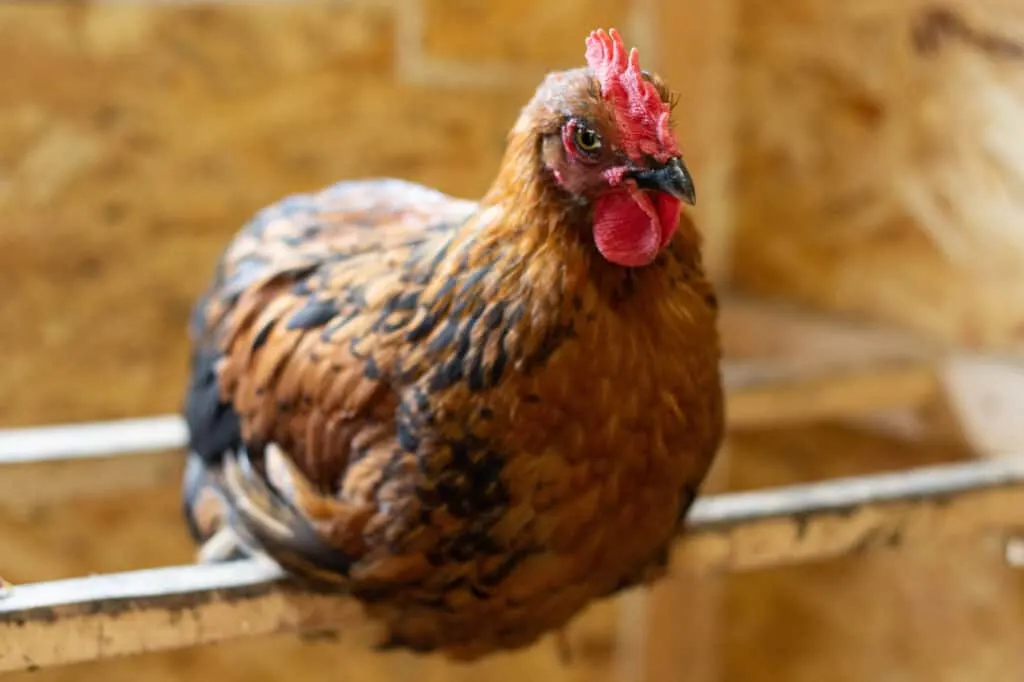
Perches
Improper perches can cause bumblefoot and frostbite, as well as pooping in nest boxes.
Always place the perch higher than the nest boxes. Natural bird behavior is to roost in the highest place possible. Raising perches should stop chickens from sleeping (and pooping) in the nest boxes.
Perches should be broad and flat with rounded edges.
Predator Proofing
Predator proofing the chicken coop is necessary and will vary depending on what predators you have in your area. At a minimum, all coops and runs should have a secure roof, predator proof door, and a skirt to stop digging predators.
NEVER use chicken wire for predator protection. Raccoons and coyotes can easily rip through chicken wire. Stick to a welded wire fence, hog panels, chainlink, or hardware cloth for predator fencing.
Maintaining Proper Hygiene
Keeping your chickens’ living environment clean and sanitary can help keep them healthy.
Clean coops and waterers can help prevent or reduce
- Lice and mites
- Worms
- Coccidiosis
- Trichomonosis
- Mycoplasma synoviae
Regular Cleaning
Regularly clean your chicken coop and nest boxes, or use the deep litter method. If you don’t use the deep litter method, regularly remove poop and dirty bedding.
Using a product like First Saturday Lime in your cleaning regime is a safe way to reduce ammonia buildup, kill any bacteria, dry out moisture, and kill mites. Nesting boxes should also be cleaned regularly, especially if your chickens poop in them.
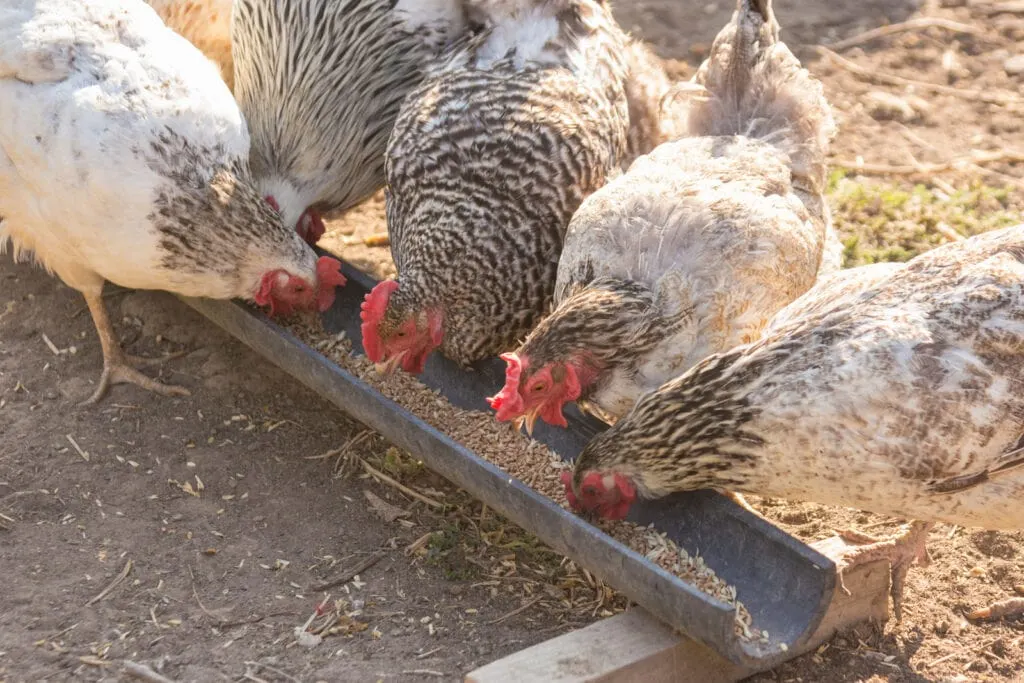
Keep Feed And Treats Off The Ground
When feeding your chickens, avoid throwing feed or treats on the ground. While chickens can peck and forage safely while free ranging, the coop, run, and area around feeders and waterers generally have higher concentrations of chicken poop on the ground.
When a chicken eats food off the ground in one of these higher concentration areas, they are more likely to contract illnesses and parasites. Ideally, keep feed in a feeder and put treats in a dish to keep them off the ground.
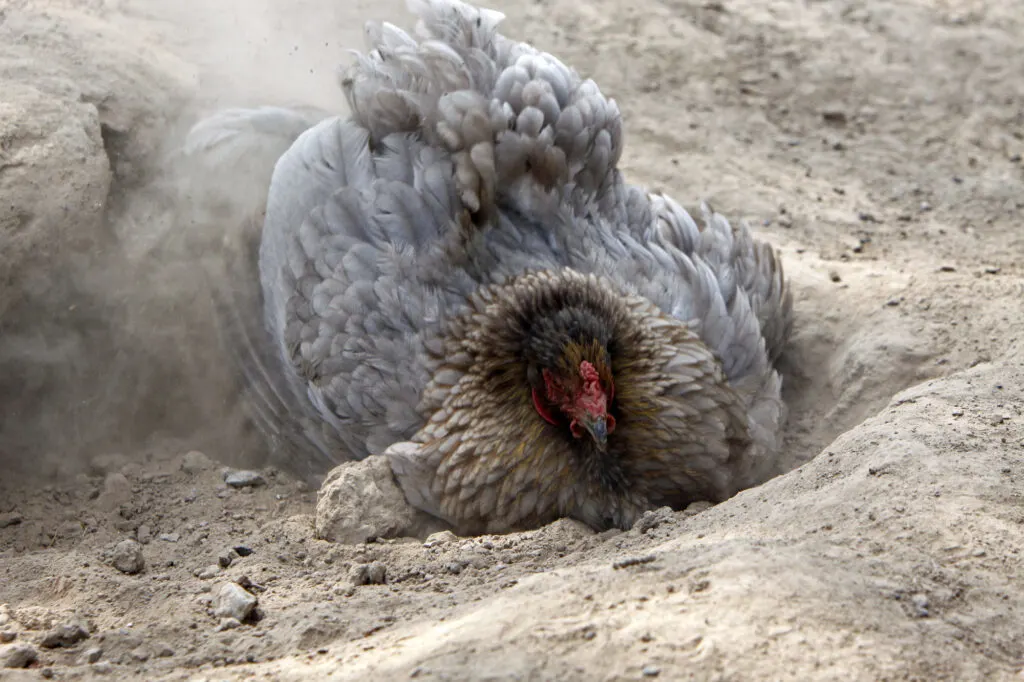
Provide A Dust Bath
A dust bath for chickens is like a shower for us. Dust baths help keep chickens clean and assist in removing or preventing feather lice and mites. You can allow your chickens to dig their dust baths or make one for them.
To make a dust bath, dig a fresh hole in the ground or find a wide tub. Mix some sand, peat moss, and regular dirt. Sulfur dust is an excellent addition as well. The chickens will take care of the rest.
Nipple Waterers
Open waterers, like water bowls or traditional style founts, are among the worst things for your flocks health.
These open water containers serve as a breeding ground for disease and germs. If a sick chicken or wild bird drinks from the waterer, it leaves pathogenic organisms in the water, spreading to other flock members. It’s like sharing a water cup with someone with the flu- yuck!
Open waterers are also notorious for spillage. Wet litter and bedding increase coccidia (coccidiosis), bacteria, and fungi in the litter. Nipple waterers, however, keep things much drier.
Switching to nipple waterers (like the Columbus Aqua horizontal nipples) can increase your flock’s health and decrease the spread of diseases such as Trichomonosis, Mycoplasma synoviae, and coccidiosis.
Trichomonosis
Contaminated water is the most common infection source for chickens, turkeys, and songbirds. The Trichomonosis parasite has been shown to survive at least 2 hours and potentially up to 24 hours in water. Frequent cleaning of waterers is vital to minimize transmission.
Source: Merck Vet Manual
Mycoplasma synoviae
Water hygiene is essential to control Mycoplasma synoviae (MS) and other respiratory diseases. Use water nipples.
Source: Washington State University-WADDL
Coccidiosis
In commercial operations, drier bedding (from switching to nipple waterers) decreased the amount of coccidia, bacteria, and fungi in the litter.
Broiler production managers reported a decrease in infectious diseases after switching to nipple drinkers.
“The use of closed (nipple) watering systems have decreased the occurrence of colibacillosis and condemnations for airsacculitis.”
Source: Diseases of Poultry. (2011). Germany: Wiley.
Quarantine New Birds
When adding new birds to your flock, they must be quarantined for at least 30 days before introducing them to your existing flock.
Birds of all kinds are experts at hiding illnesses. As prey species that are pretty low on the food chain, birds will instinctively hide any signs of weakness. So, when you bring home a new bird, it may seem healthy at first, only to find out that it was hiding an illness.
Texas A&M recommends quarantining birds for six weeks, which is ideal. Thirty days may not always be long enough to ensure the health of new flock members.
Regardless of where you obtain birds from, if they will be introduced to an existing flock, the new birds must be quarantined. Because they are at the bottom of the food chain, birds are experts at hiding illnesses. In some cases, an infected bird may not have any clinical signs.
Any bird introduced to an existing flock should be quarantined for at least 30 days, with 90 days ideal. During this time, the new birds can be monitored for illnesses and treated as needed.
If the new birds are infected with a lifelong disease, they should not be added to the existing flock, as they can also make all of your other chickens sick.

Practice Biosecurity
Biosecurity refers to the active prevention of disease within your flock. When it comes to keeping your chickens healthy, there are some things you may not even think about.
- Keep outside visitors to a minimum
- Don’t visit other flocks
- Keep wild birds and rodents out of the coop and run
- Keep coop and run clean
Visitors and wild animals (like birds and rodents) can spread diseases to your flock. When visiting a friend’s flock, you could also accidentally bring home diseases on your clothes and shoes.
For more in depth information on biosecurity, check out the USDA Defend The Flock resource center.
Buy Healthy Birds
Buying healthy birds from a reputable breeder or hatchery is another way to prevent illness and disease in your flock.
When buying from backyard breeders or those downsizing their flock, it is possible to end up with a sick bird or one that does not appear ill but carries a disease. Often, these folks genuinely did not know their birds were ill, and it’s an honest mistake. Regardless, introducing a sick bird into your flock can be devastating.
Reputable breeders and hatcheries understand the importance of healthy, disease free birds. Many have National Poultry Improvement Plan (or NPIP) certifications, which means the birds have been tested to be free of certain diseases. NPIP only tests for select diseases, and a bird can be sick with an illness that NPIP does not monitor, such as infectious coryza.
Only a few diseases can be transmitted from mother hen to chick while it is still in the egg, so generally speaking, chicks from a hatchery or reputable breeder are your best bet for disease-free birds. Chicks can also be vaccinated in the hatchery, which protects them from other diseases.
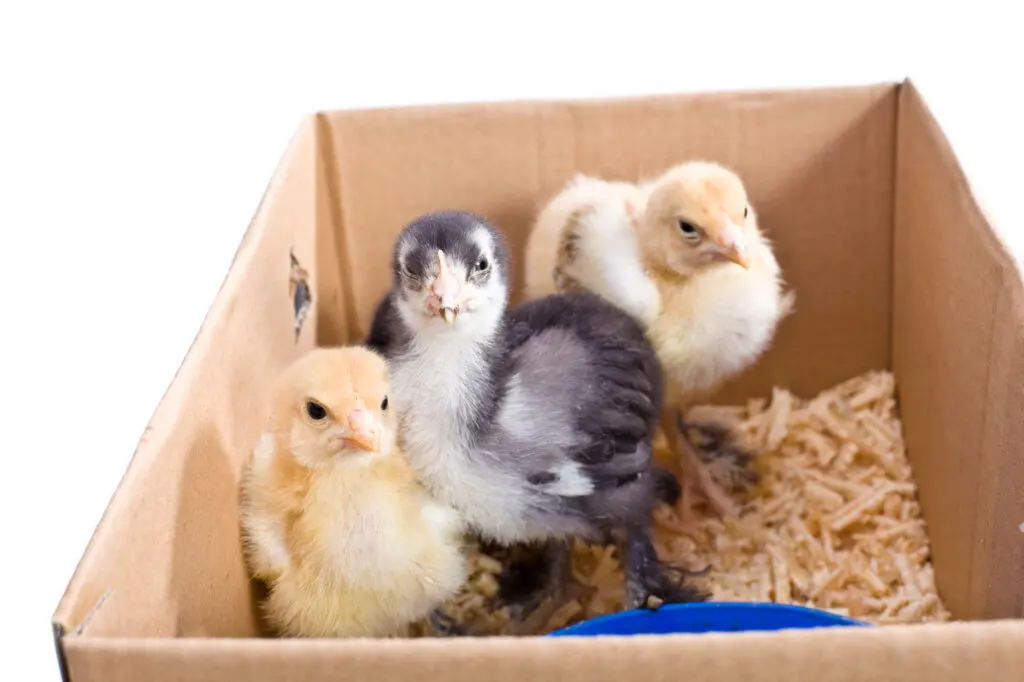
All In, All Out
A standard recommendation for keeping disease out of backyard flocks is the practice of all in, all out. This means that no new chickens are ever added to your flock. The flock you have is the flock you’ve got.
If you want new chickens, an entirely new flock should be purchased (all in), and the existing flock should be rehomed to the same place (all out). Because new birds are not being added to an existing flock, it is unlikely to introduce a new illness to disease to your birds.
Should I vaccinate my chickens?
Vaccines work by injecting a small amount of weakened disease or protein, which causes the immune system to build a defense against that disease.
There are several vaccines available for chickens, including:
- Marek’s disease
- Coccidiosis
- Fowl pox
- Salmonella
- Infectious Coryza
- Mycoplasma gallisepticum
- Newcastle disease virus and Infectious bronchitis combo
- Avian encephalomyelitis and fowl pox combo
For backyard chickens, Marek’s Disease and Coccidiosis vaccines are often offered at the hatchery. There is usually some confusion on whether or not you should order vaccinated chicks from a hatchery. Ultimately, it comes down to personal preference and your specific situation.
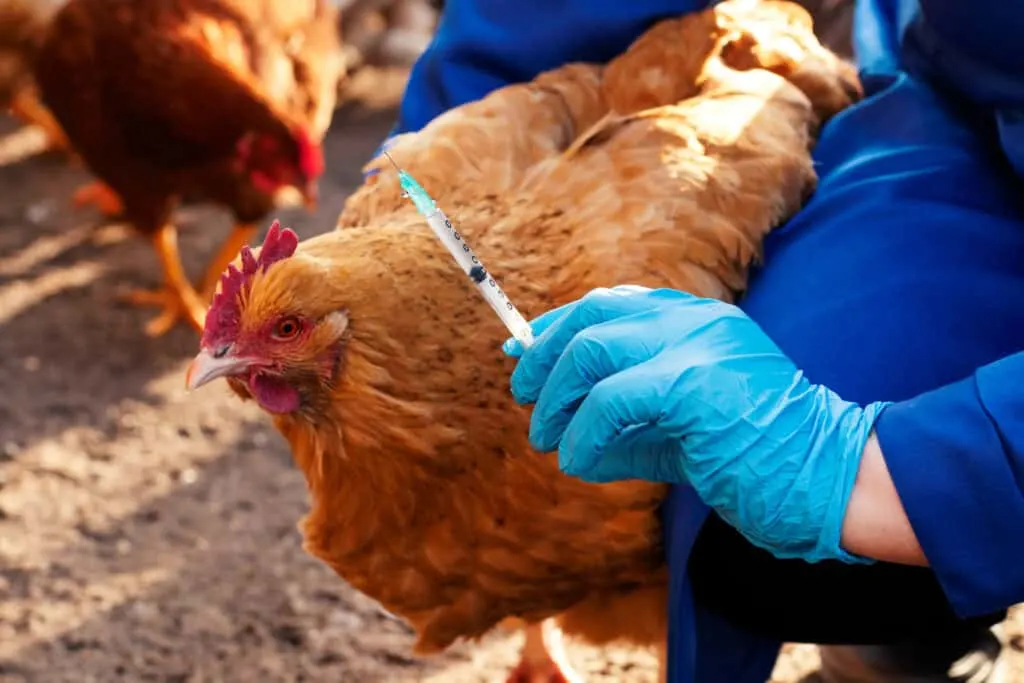
Chicken Disease and Human Health Risks
As a backyard chicken owner, it is crucial to know that a few chicken diseases can be transmitted to humans.
The majority of chicken diseases are only contagious to other birds or animals, but some are zoonotic. A zoonotic disease can be transmitted from a chicken to a human.
Chicken diseases that are contagious to people include:
- Avian chlamydiosis (Chlamydia psittaci)
- Avian Influenza
- Campylobacter (Campylobacter spp.)
- Clostridium perfringens
- Cryptococcus (Cryptococcus neoformans)
- Cryptosporidium
- E. coli (Escherichia coli)
- Eastern & Western equine encephalitis
- Erysipelas (Erysipelothrix rhusiopathiae)
- Fowl Cholera (Pasteurella multocida)
- Histoplasmosis (Histoplasma capsulatum)
- Listeriosis (Listeria monocytogenes)
- Microsporum gallinae
- Newcastle Disease
- Salmonella (Salmonella enteritidis)
- Staph infection (Staphylococcus spp.)
- Tuberculosis (Mycobacterium avium)
- Yersinia spp.
Histoplasma capsulatum and Cryptococcus neoformans are fungi that can grow in bird droppings and are not diseases that the bird itself would be a carrier.
Some people may develop an allergic reaction to a chicken feather dander or dry feces dust, called allergic pneumonitis.
Salmonella and campylobacter are the most commonly reported zoonotic diseases.
In most cases, diseases are transmitted to humans by inhaling contaminated feces dust, respiratory aerosols, or ingesting food or water contaminated by feces.
Raising chickens can also attract rodents and mosquitoes. Rodents may be carriers of Leptospirosis, rat-bite fever, and Hantavirus, while mosquitoes can transmit viral diseases from chickens to humans.
Since some diseases can be transmitted to humans, it is crucial to maintain proper chicken coop hygiene and handling practices.
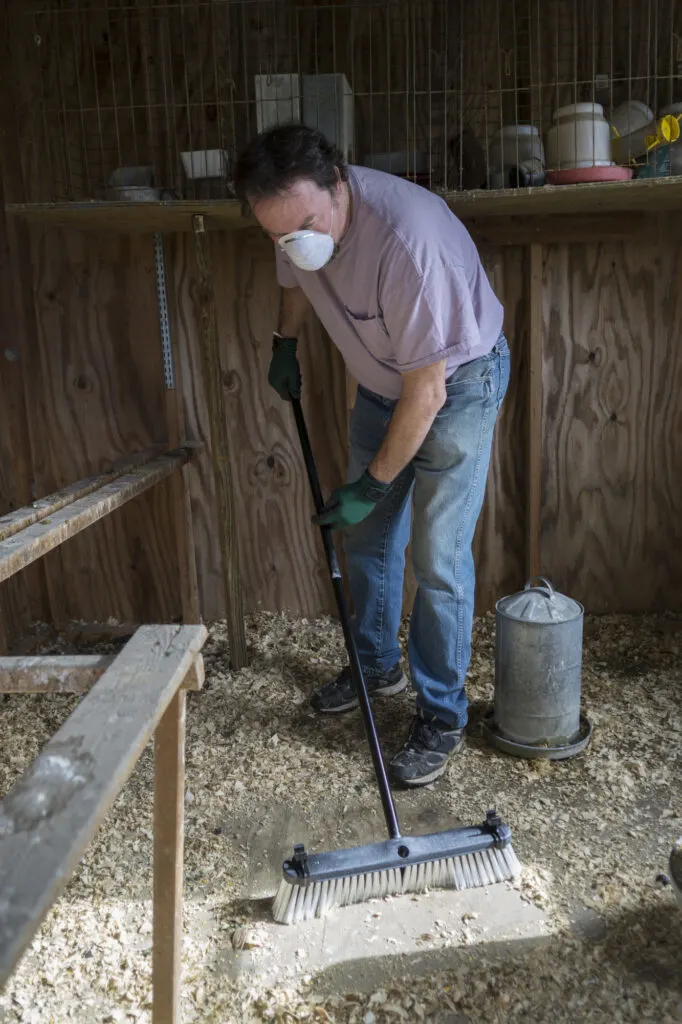
To protect yourself from becoming ill, the Center for Disease Control and the Association of Avian Veterinarians recommend the following:
- Children, pregnant women, immunocompromised individuals, and older adults should use extra caution in the chicken yard
- Wash your hands with soap and water after handling chickens (including chicks) or cleaning the coop
- Wear a mask and gloves when cleaning the coop
- Wash eggs before using them. Fresh eggs should be washed with warm water, refrigerated eggs with cold water, and washed eggs should always be refrigerated.
- Throw away cracked eggs
- Don’t wear shoes inside the home that have been in the chicken coop or yard
- Don’t eat or drink while in the chicken coop
- Don’t kiss, snuggle, or have chickens near your face
- Don’t allow chickens inside the house
- Clean chicken water containers and food dishes outside, not in the kitchen
- Wear gloves and eye protection when handling sick birds or treating bumblefoot

What To Do First
When you have a sick chicken, chances are you’ll be upset. That’s completely understandable.
It may be difficult, but take a moment to pause and collect yourself. No one wants their dear Henrietta to be hurt or ill, and it can be very stressful. Try to remain calm as you go through the process of examining your bird and diagnosing the problem. Ask a friend for help if you need to.
Isolate The Sick Bird
If only one or two birds from the flock are ill, they need to be isolated to reduce the chances of spreading disease to other birds.
Sick birds are also prone to bullying, and removing them from the flock can give them the opportunity to relax and heal.
What’s the best way to quarantine a sick bird?
The best way to quarantine a sick chicken is to use a portable dog kennel. You could also use a large storage tub (with no lid), a large cardboard box (again, left open), etc.. The bathtub would also work in a pinch.
The garage is a good place to keep a sick chicken. The garage is usually dimly lit and quiet.
The house is not the best place for a sick chicken. It tends to be noisy with a lot of activity, which can be stressful. Also, if the bird has a disease that could be transmitted to humans, keeping it in the house isn’t the best idea.
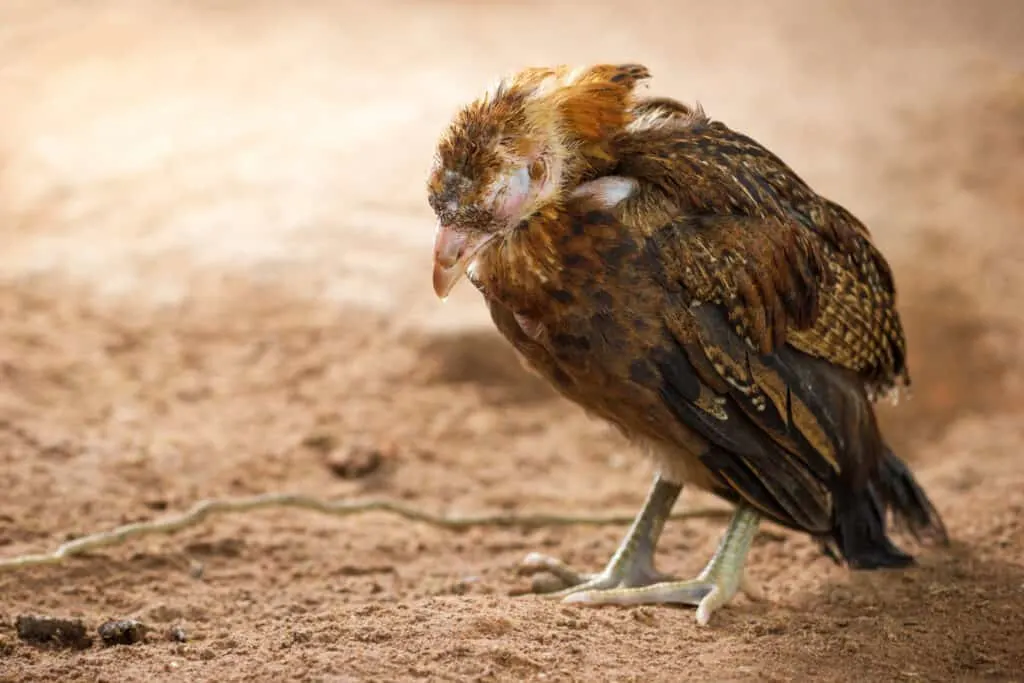
Disclaimer: While I do have many years of emergency medical experience, I am not a veterinarian. Information in this post was gathered from veterinary manuals listed in the “sources” section below. Please contact your veterinarian before administering medications to your birds.
Sick Chicken Symptoms
Birds in general are a prey species. Since they are at the bottom of the food chain, showing any signs of weakness means that they could be someone’s meal. Because of this, they are VERY good at hiding any signs that they may be sick.
This means that when a bird is sick enough to show signs of illness, they are very, very sick.
To make things more complicated, some illnesses have few or no signs except sudden death.
Clinical Signs vs Symptoms
It is worth taking a moment to clarify some terminology. You will see the term “clinical signs” often in this article. What are clinical signs?
First, let’s define what is a symptom.
Symptoms are something that is felt or experienced but is not necessarily seen. When you tell the doctor that you have body aches- this is a symptom. The doctor cannot see your body aches, even though you feel them.
Obviously, chickens cannot tell you what they are feeling, so we must look at them and make an educated guess on how they are feeling by the way that they look. A clinical sign is something that can be seen. When you are at the doctor’s office with body aches (symptom) and the doctor can see that you are sweating- the sweating is a symptom of your medical condition.
So, when it comes to chickens, we have to observe the clinical signs of illness, because they cannot tell us their symptoms.
How do chickens act when they are sick
In most cases, a sick chicken is obvious. Depending on the underlying illness, a sick chicken will often be weak. It may have pale skin, or stand in one spot with ruffled feathers. Sometimes a sick chicken will sneeze or wheeze. Laying hens will often have a decrease in egg production, or stop laying altogether.
Much like when humans get sick, the signs of a sick chicken will vary depending on what is wrong.
There are also subtle signs that a chicken may not be feeling well.
Appetite
A healthy chicken has an appetite and will eat and drink water like normal. A sick bird may not eat or drink at all, or may eat and drink more than normal.
Droppings
A birds droppings can tell you a lot about what is going on inside their body. Normal chicken droppings are well formed, light brown with a little bit of white.
If a chicken has loose droppings (diarrhea), droppings that are a different color (red, green, tan, or white), these can be a sign that something is wrong.
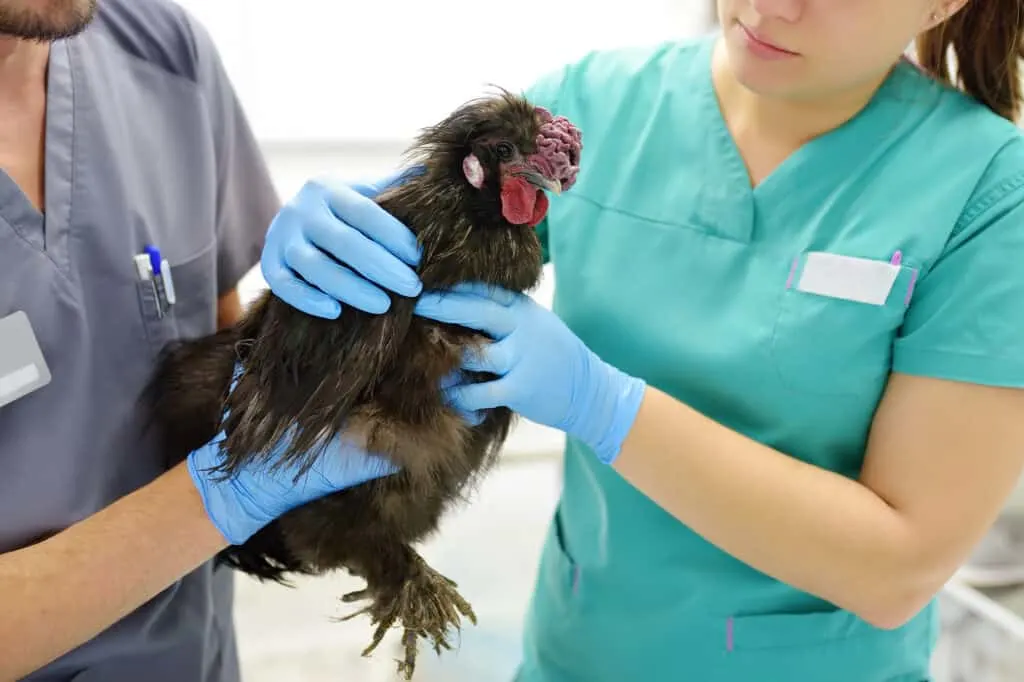
Perform A Chicken Exam
An important step in figuring out what is wrong with your sick chicken is by gathering information, observation, and performing a full body exam.
Background information
Start by gathering some basic information that will be used to help diagnose what is wrong with your bird. It may be helpful to grab a pen and a piece of paper to keep notes.
Answer the following questions:
- Is the bird a new member of the flock or an existing member?
- Have you added any new birds in the last three months? If so, were they quarantined?
- Have you visited anyone else’s flock?
- How old is the bird?
- What breed is it?
- Are other birds experiencing similar signs?
- Have you moved the birds to a new location?
- Have you changed their food?
- Have they been given any recent medication or supplements?
- Is anything else new or different within the last three months?
Observation
Before physically examining your sick bird, just sit quietly for a few minutes and observe the bird. Don’t talk to it or touch it. You just want to watch and see how the bird is acting.
As you quietly observe the chicken, record your answers the following:
- Is the bird alert to its surroundings or seem drowsy and unengaged?
- Is the bird standing, physically unable to stand, or too weak to stand?
- Are the feathers flat or ruffled/puffed out?
- Is the waddle and comb normal colored (pink or red), or is it pale?
- Is the chicken breathing normally, struggling to breathe, gasping, or making a noise when breathing?
- Is the chicken sneezing or coughing?
- What do the droppings look like? Is it normal, diarrhea, red, foamy, or green?
- Is the bird twitching, shaking, or convulsing?
- Does anything else look unusual or different?
- Is the bird eating and drinking normally?
Head To Toe Physical Exam
Once you have finished your observation, it is time for a hands on exam. Ask a family member or friend for help if you need it.
Be gentle and quick but thorough. Handling is stressful for birds, and it could be too much for an ill bird.
Start at the chickens head and work to the feet. Check the skin under the feathers, under the wings, and inside the mouth. Look for any injuries, mites or lice, lumps, or anything unusual.
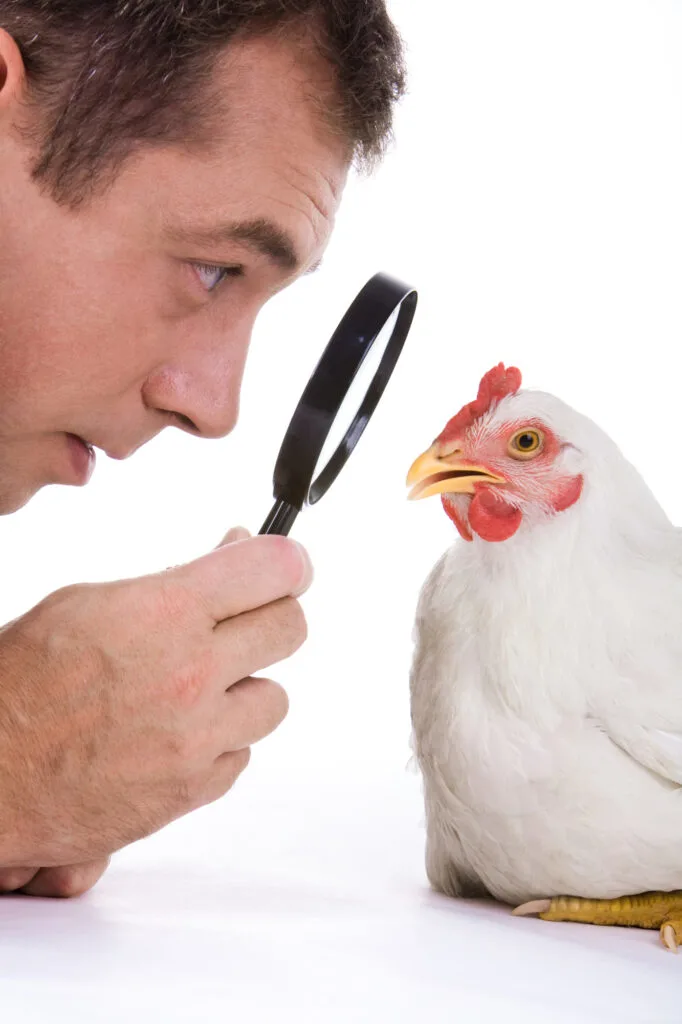
Common Chicken Illnesses & How to Treat Them
There are several diseases that can affect a chicken, but for the purposes of this article, we will be focusing only on the most common for backyard chickens.
Respiratory Illness
Respiratory infections are not uncommon in backyard poultry and can be fungal, bacterial, or viral.
Chickens pick up respiratory infections from several sources, including improper coop ventilation, disease spread from wild birds, and the introduction of nonquarantined flockmates, to name a few.
Bacteria, viruses, or fungus can cause respiratory infections. These all present with similar signs, so telling the difference between them can be very difficult. Signs of illness often include coughing, sneezing, difficulty breathing, nasal or eye discharge, lethargy, and an overall ill bird.
Viral infections, much like in humans, cannot be treated with medications. Fungal infections also have no drug-based treatment options. Bacterial infections can be treated with antibiotics.
Common respiratory illnesses:
- Infectious Coryza- bacteria
- Avian Influenza- virus
- Infectious Bronchitis Virus (IBV)- virus
- Infectious Laryngotracheitis (ILT)- virus
- Mycoplasma gallisepticum (MG)- bacteria
- Mycoplasma synoviae (MS)- bacteria
- Aspergillosis- fungus
- Newcastle Disease- virus
- Cryptosporidiosis- parasite
- Respiratory adenovirus infection- virus
- Respiratory disease complex- multiple infections at once
Other ailments affect the respiratory system but are not strictly a respiratory infection. These include E. Coli, fowl cholera, gapeworm, wet fowl pox, Candidiasis (thrush), and trichomonosis.
Infectious Coryza
Infectious coryza is a bacteria that causes respiratory disease in chickens. Infectious coryza infections can also be combined with other conditions such as infectious laryngotracheitis virus, mycoplasma gallisepticum, fowl pox, infectious bronchitis, Pasteurella sp..
It is most common in California and the southeast, although it can be found across the USA.
Along with other classic signs of a respiratory infection, the eye cavity often develops a large mass of off-white, cheese-like pus. The bird will usually have an unpleasant, foul odor around the face.
Mycoplasma gallisepticum
Mycoplasma gallisepticum is a bacterial infection that causes respiratory infections. Birds infected with MG become lifetime carriers.
Signs of infection usually develop slowly and include difficulty breathing, coughing, sneezing, slight to severe abnormal breathing sounds, nasal discharge, conjunctivitis, bubbles in eyes, swelling around the eyes, weight loss, decreased egg production, decreased appetite.
Mycoplasma synoviae
Mycoplasma synoviae is a bacterial infection that most often infects the upper respiratory tract and usually occurs with Newcastle disease or infectious bronchitis. It is common in multi-age layer flocks. While MS can occur at any time of the year, it is most common in the cold, damp season or whenever litter is wet.
Birds with Mycoplasma synoviae will often have no obvious signs of illness. The first sign is usually a blue or purple head, difficulty walking (lameness), and a tendency to sit.
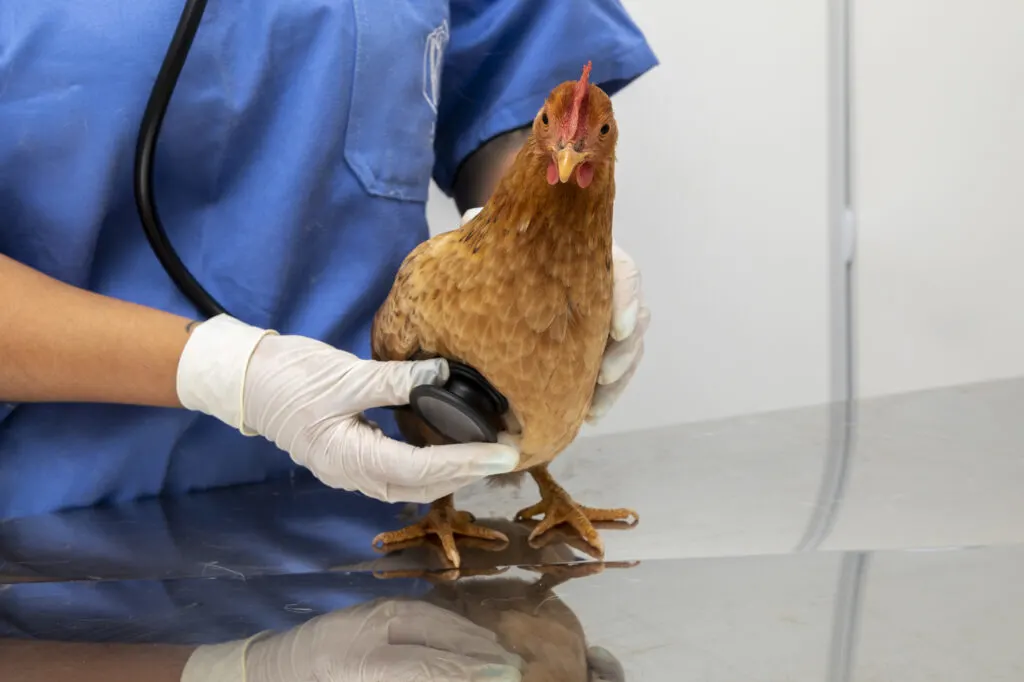
Reproductive
Reproductive system diseases are those that affect the ovaries, oviduct, and uterus of female chickens. These diseases are usually limited to laying hens, younger birds generally do not have reproductive system issues.
Salpingitis
Salpingitis is an inflammation of the oviduct, often due to a previous infection such as Mycoplasma gallisepticum, fowl cholera, E. coli, or Salmonella. An oviduct is usually a sterile place. However, these infections can spread from the left abdominal air sac or the peritoneal cavity to the oviduct.
This infection can cause hens to lay an egg shaped mass of pus called a lash egg.
Digestive
Diseases of the digestive system can affect the crop and the intestines. If you have a sick chicken, and there are no signs of a respiratory infection, the odds are high that the illness is in the digestive system.
- Candidiasis
- Coccidiosis
- Helminthiasis
- Roundworms
- Tapeworms
- Capillary worms
- Cecal worm
- Necrotic Enteritis
- Ulcerative Enteritis
Candidiasis
Candidiasis (also called thrush or sour crop) is a fungal yeast infection of the digestive tract, especially in the crop, caused by Candida albicans. The yeast is often present in birds but only becomes a problem when birds are stressed, infested with worms, vitamin deficient, or have poor water hygiene.
When the crop cannot empty after eating, the food will ferment in the crop, which is why this condition is called sour crop.
Coccidiosis
Coccidiosis is caused by a single cell protozoan (parasite). Nine species infect chickens (E. acervulina, E. necatrix, E. maxima, E. brunetti, E. tenella. E. mitis, E. mivati, E. praecox, and E. hagani. ). The parasite infects the intestines, causing extensive damage to the intestinal mucosa. Each strain of Eimeria infects a different part of the intestines. Eimeria tenella, for example, infects the ceca. Coccidiosis is then spread to other birds through oocytes (Eimeria egg cells) in their droppings.
Because coccidiosis damages the intestines, the most common symptom is blood in the chickens droppings.
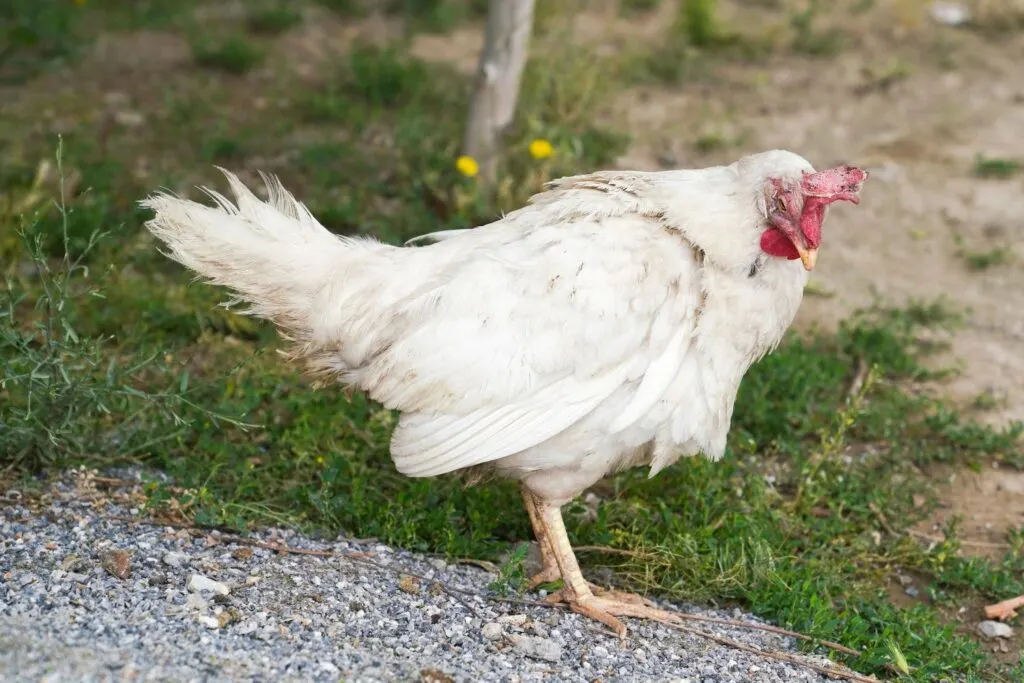
Internal Worms
Helminths, or worms, are a prevalent problem for backyard flocks. Numerous surveys have found that 80-99.6% of all free-range chickens are infected with at least one species of helminth, with infestations peaking in the summer months.
While many worms can infect chickens, the most common worms found in backyard chickens are roundworms, tapeworms, gapeworms, cecal worms, and capillary worms. Learn more about worms and chickens.
Nectoric Enteritis
Necrotic enteritis is caused by the bacteria Clostridium perfringens. Clostridium perfringens is a bacteria typically found in the gut and the soil, feed, and used poultry litter. However, when chickens are faced with an ailment like coccidiosis, intestinal worms, mycotoxicosis, infectious bursal disease, chicken anemia virus, Marek’s disease, or salmonella infection, the Clostridium perfringens can attach to the intestines and cause significant damage.
Necrotic enteritis can also result from sudden changes in feed or the addition of fish meal, barley, oats, rye, or wheat, which alters the gut microflora. Essentially, anything that promotes bacterial growth in the GI tract, produces toxins, or slows the passage of feed through the small intestine could promote necrotic enteritis.
Chickens with nectoric enteritis may have diarrhea, appear ill, or have sudden death.
Ulcerative Enteritis
Ulcerative enteritis is caused by Clostridium colinum and is often associated with stress, coccidiosis, chicken anemia virus, necrotic enteritis, histomoniasis, and infectious bursal disease.
Chickens that have ulcerative enteritis may not show any signs other than sudden death. Others will appear generally ill and weak.
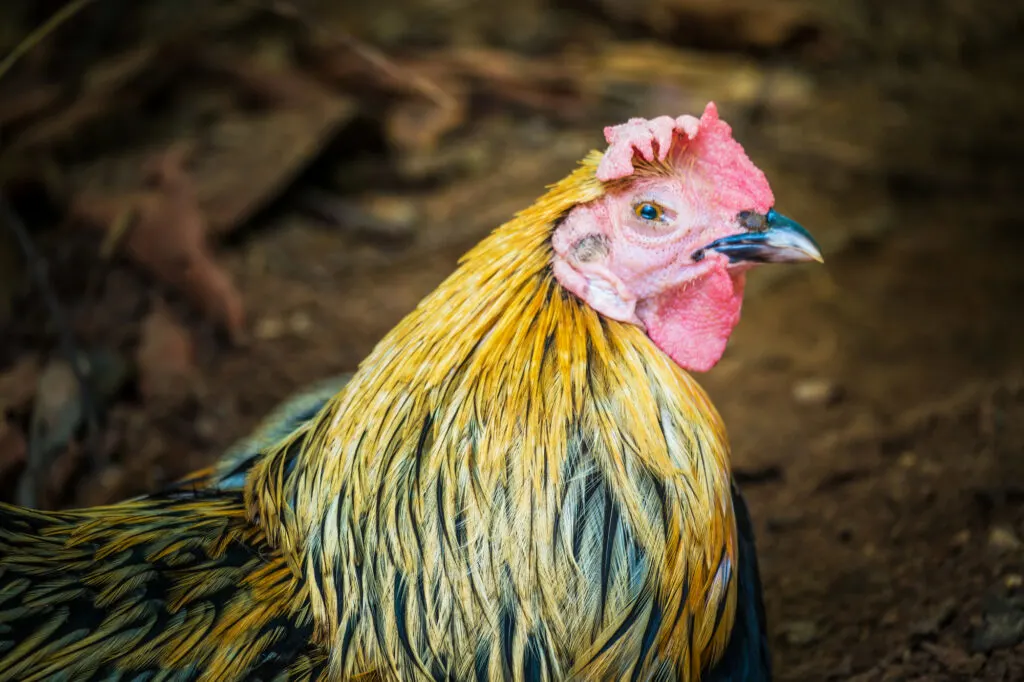
Heart, Blood, and Vascular Disease & Ailments
Laying hens usually do not have problems with their vascular system, while broilers are more susceptible. The most common problem in the backyard flock is ascites, known as “waterbelly”.
Ascites
Ascites, commonly called waterbelly, is generally caused by right-sided heart failure. However, it can also result from pulmonary hypertension, liver damage from toxins or infection, lung damage, and genetic predisposition.
Broilers are more likely to develop ascites because of their high metabolism and oxygen demand, but laying hens are also susceptible. Birds at high altitudes (over 3000 ft) are more prone to ascites, and cold stress during the first three weeks of life significantly increases the risk of ascites later in life. In broilers, ascites is more common in males than females.
Birds with ascites will have a large, swollen abdomen that is squishy like a water balloon.
Musculoskeletal Diseases & Ailments
Musculoskeletal, or problems with bones and muscles, are somewhat common in chickens, the most notable being bumblefoot. These can be caused by genetic problems, vitamin deficiencies, or improper flooring.
The most common musculoskeletal problems are:
- Bumblefoot
- Slipped Tendon
- Splay Leg
Bumblefoot
Bumblefoot is an infected foot abscess (staph infection). It can be caused by injuries such as a cut, scrape, thorn, puncture from toenail, or splintered roost that becomes infected. Bumblefoot can also result from a poor nutritional diet or buildup of feces in the coop or run.
Bumblefoot can be fatal if not treated quickly. The classic sign of bumblefoot is a swollen footpad with a round, black scab.
This infection needs to be removed so that it does not spread.
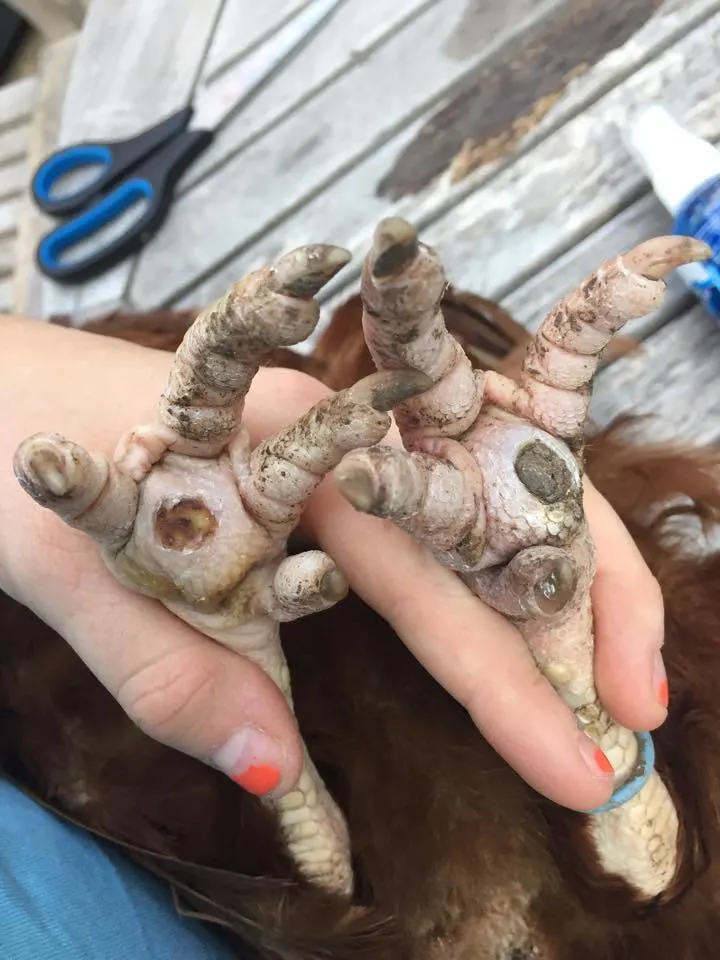
Slipped Tendon
Slipped tendon is a musculoskeletal problem in which the affected leg turns outwards at an angle at the hock. It is caused by vitamin deficiency in birds usually lacking manganese, choline, and/or zinc. Birds may also be deficient in pyridoxine, biotin, folic acid, or niacin.
When these vitamins are lacking, the growth plates in the legs become damaged, allowing the gastrocnemius tendon to slip out of placement. Unfortunately, there is no fix for slipped tendon other than surgery. The affected leg becomes worse over time and will eventually cause pain.
Birds with slipped tendons should have surgery or be humanely euthanized.
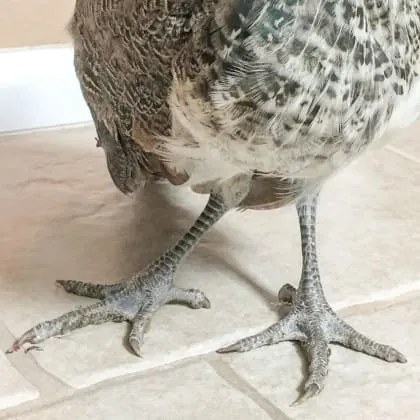
Splay Leg
Splay leg occurs when the incubator or brooder floor is too slippery for a newly hatched chick. Because the bird is young and weak, it cannot stand, and one or both legs will slide outwards. Even if the bird is moved to a nonslip floor, it will not be able to stand up.
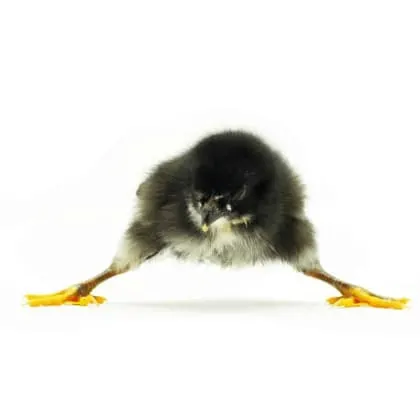
Skin, Beak, Nail and Feather Disease & Ailments
Several diseases and ailments affect the skin and nails, including mites, lice, ticks, frostbite, and favus.
- Red Mite
- Northern Fowl Mite
- Scaly Leg Mite
- Feather mite & Depluming mite
- Lice
- Fleas
- Fowl Ticks
- Frostbite
Feather lice & mites
Feather lice and mites are a very common problem for backyard chickens. These pests are introduced to the flock by infested chicken coops (purchased used), infested chickens, contaminated surfaces, or wild birds.
These pests can usually be seen on the chickens skin or in their feathers. While they can be treated, treatment options are specific to the type of parasite. There are also several effective natural treatment options.
Some of these lice and mites can bite humans, causing itching and irritation. However, none of the lice and mites that infect chickens can live on humans.
Frostbite
Frostbite is permanent tissue damage caused by cold and humid temperatures. Large combs, wattles, and toes are most susceptible. Frostbitten tissue is usually white at first, turning black before it dries up and falls off. The tissue cannot be saved and will not regrow.
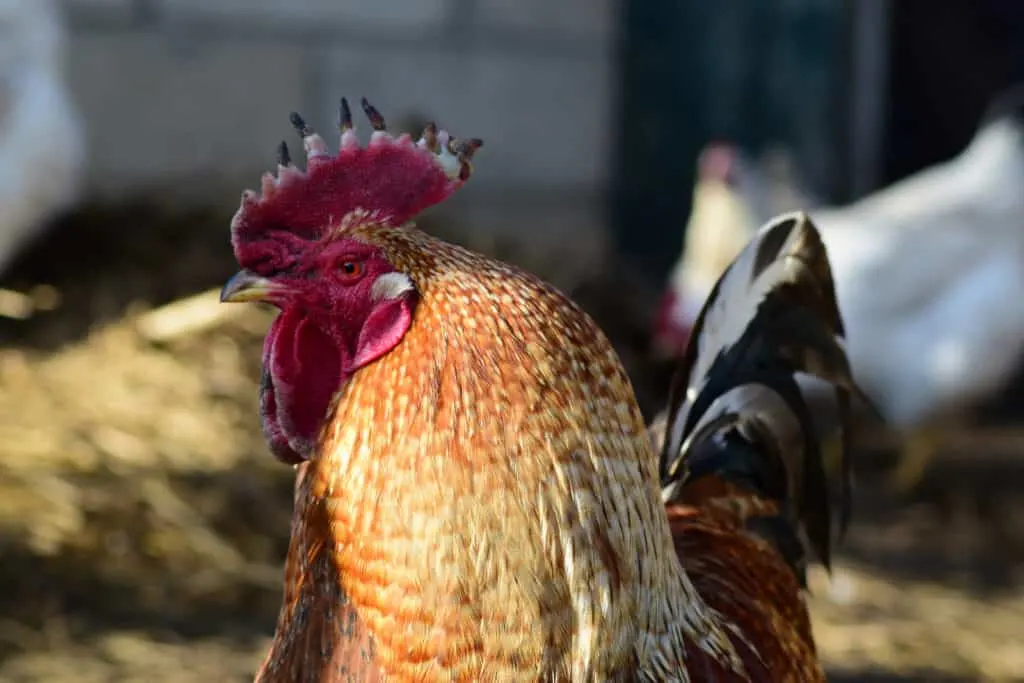
Behavioral
Some issues that may look like disease are actually behavioral problems. This is especially true for cannibalism and bullying.
Cannibalism
Cannibalism is a behavioral disorder where birds actively pick at, draw blood, or eat feathers on other chickens. This is not to be confused with bullying, fighting, or establishing pecking orders.
Cannibalized birds may be missing feathers or have bloody vents from being attacked. In most cases, cannibalism is due to overcrowding, nutritional deficiencies, or boredom. Cannibalism is often fatal.
Systemic Diseases & Ailments
Several diseases and ailments affect multiple body systems or can spread throughout the body. For example, fowl cholera often presents as a respiratory infection. While that is what you can see, the disease may actually be damaging other parts of the body (like the liver) at the same time.
- Avian Influenza
- Erysipelas
- Fowl Cholera
- Fowl Pox
- Listeriosis
- Marek’s Disease
- Pullorum Disease
- Trichomonosis
Avian Influenza
Avian influenza is a viral infection that can generally be classified as low pathogenic (causing few symptoms, including respiratory disease) or high pathogenic (causing severe systemic disease). Wild waterfowl and shorebirds spread avian influenza.
Birds with Avian Influenza will often have difficulty breathing, sneezing, coughing, blue head, and other typical signs of respiratory infection.
Avian influenza can be transmitted to humans.
Erysipelas
Erysipelas is a bacterial disease that is more common in turkeys than chickens. It can cause sudden death with no other signs of infection.
Erysipelas can be transmitted to humans.
Fowl Cholera
Fowl cholera is a relatively common, highly contagious bacterial disease. It can either be acute (occurring once) or chronic (occurring many times) and is more likely to occur when birds are stressed. Chronic Fowl cholera is more common in chickens.
Depending on the severity of fowl cholera, some birds may die before showing any symptoms. Others may lose weight, have a blue head, difficulty breathing, diarrhea, joint swelling, or wry neck.
Fowl cholera can be transmitted to humans.
Fowl Pox
Fowl pox is a DNA virus found throughout the world. There are two varieties of fowl pox. Dry fowl pox (cutaneous form) affects the skin, while wet fowl pox (diphtheritic form) affects the upper GI and respiratory tracts.
Dry fowl pox appears as multiple scabs on the comb and wattles. In wet fowl pox, birds will have lesions inside their mouth.
Listerosis
Listeriosis is caused by the bacteria Listeria monocytogenes. Listeria monocytogenes naturally occur in the environment and are often found in the soil, animal feces, and surface water. It is also commonly found in the intestines of healthy animals.
Birds with Listerosis generally show no signs of illness other than sudden death.
Listerosis can be transmitted to humans.
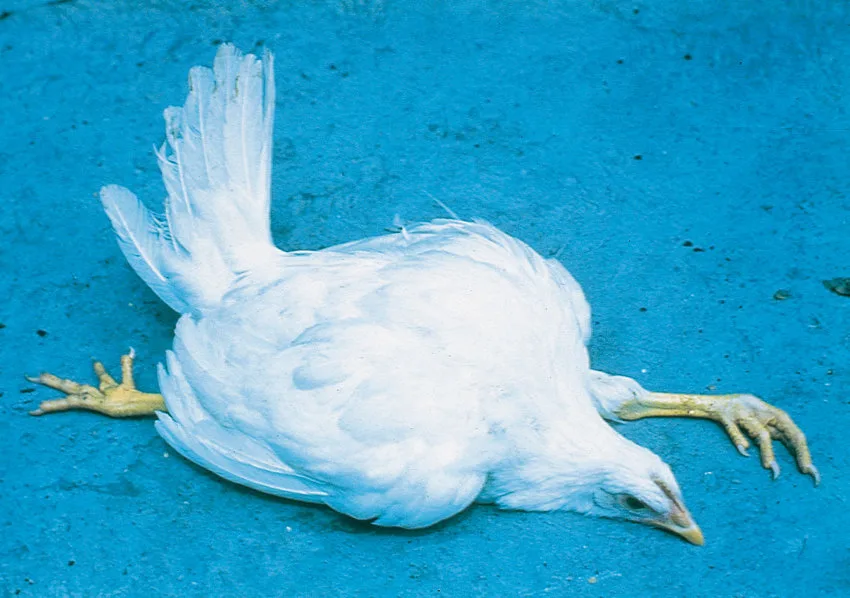
Marek’s Disease
Marek’s disease is a highly contagious poultry disease caused by a herpes virus. The virus causes enlarged nerves, which results in correlating symptoms. For example, the classic single-leg paralysis is the result of nerves in that leg being enlarged.
The ocular form of Marek’s disease can cause a birds pupil to become irregularly shaped, and the iris turn grey.
Pullorum Disease
Pullorum is an egg transmitted disease and caused by the bacteria Salmonella enterica Pullorum. It was once common but has since been eradicated from commercial flocks, although it is still found in backyard flocks.
Pullorum primarily affects chicks. Adults often do not have symptoms, but those that do may appear generally ill.
Trichomonosis
Trichomonosis is a flagellated protozoan parasite that can live in the sinuses, mouth, throat, liver, and other organs. It is also common in turkeys, pigeons, doves, and birds of prey.
This parasite forms yellow colored pyramidal or conical shaped growth inside the mouth that can spread to the brain.
Other Diseases & Ailments
The diseases and ailments listed here did not fit into any of the other categories listed.
- Flystrike
- Heat Stress
- Pasty Butt
- Wounds & Traumatic Injuries
Flystrike
Flystrike is a condition where a living animal becomes infested with maggots.
Flies, specifically the Blow Fly (a metallic green or blue fly common in the summer months), are attracted to animal wounds, feces, and decaying tissue. Blow flies may lay their eggs on wounds or in matted feathers covered in feces. 8-12 hours later, the eggs hatch into maggots, and they start by consuming the dead tissue in the wound or the feces. Then, the maggots eat their way into the animal’s body, living off the healthy flesh.
They cause significant damage to the animals, and flystrike often leads to secondary infections, sepsis, or toxemia.
Heat stress
Birds do not have sweat glands and can quickly become overheated in the hot summer months. Temperature over 95 degrees Fahrenheit can be fatal to adult chickens. Heat stress can occur outside, in hot coops, or overheated brooders.
Pasty Butt
Pasty Butt is when feces become stuck to feathers around the vent, sealing the vent and not allowing the bird to pass feces. Pasty butt can be fatal in a short period of time. It is most common on young chicks still in the brooder but can occur at any age. In chicks, pasty butt is usually the result of stress (especially if they were shipped in the mail) or fluctuating brooder temperature.
Traumatic Injuries & Wounds
Wounds and traumatic injuries can result from predator attacks, rooster spurs, fights, cannibalism, and accidents. While wounds often look horrendous, birds are surprisingly good at healing with the proper care.
Treatment for wounds entails gentle cleaning, applying an antibiotic ointment, and covering the wound to keep it moist. The bandages need to be replaced daily to prevent infection.
Age Specific Problems
Some ailments are age specific. For example, splay leg only affects young birds in the incubator or brooder, while salpingitis only happens in laying hens.
How To Treat A Sick Chicken
As of April 2021, there are only 21 FDA-approved drugs for laying hens. Many of these approved medications can only be obtained from a veterinarian.
That said, there are other medications that can be used to treat chickens. Because these are not FDA approved, they should not be used in laying hen or meat birds.
FDA Approved Medications:
- Bacitracin zinc- increases growth rate
- Amprolium- treats coccidiosis
- Chlortetracycline (calcium)- tetracycline antibiotic
- Bacitracin/ methylene disalicylate
- Chlortetracycline- tetracycline based broad-spectrum antibiotic
- Erythromycin thiocyanate- erythromycin based broad-spectrum antibiotic
- Hygromycin B- aids in the control intestinal parasites
- Coumaphos- for external parasites
- Proparacaine hydrochloride
- Nystatin- treats fungal infections
- Fenbendazole (only Safe-Guard® AquaSol)- treats worms
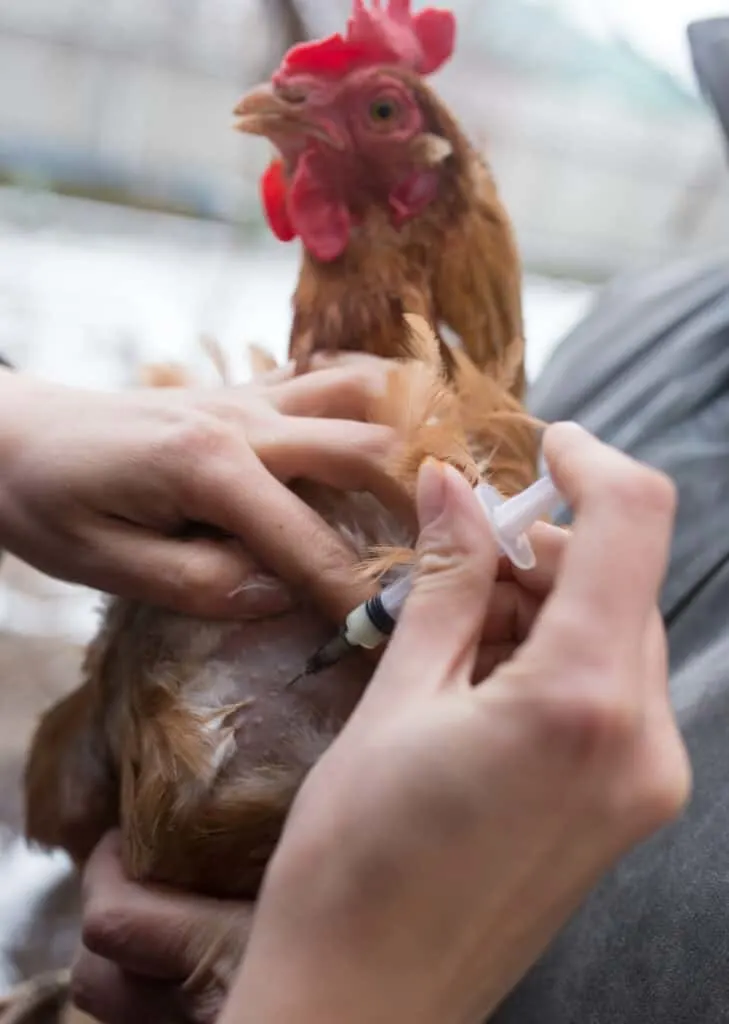
Antibiotics
Antibiotics can be used to treat many respiratory and digestive illnesses that are caused by a bacteria.
Baytril
Baytril (Enrofloxacin) is a broad-spectrum antibiotic that treats intestinal and respiratory infections.
Enrofloxacin is a fluoroquinolone antibiotic and was banned for use in laying hens by the FDA in 2005. During this time, the prevalence of fluoroquinolone-resistant Campylobacter spp in poultry and humans was increasing. Enrofloxacin was banned to reduce the development of additional fluoroquinolone-resistant bacterial strains. In simple terms, the FDA says that enrofloxacin should not be used on food producing animals.
Tylan
Tylan (Tylosin) is a macrolide antibiotic related to erythromycin. It is available as an injectable and water soluble powder. It can treat most of the common respiratory infections but is not FDA approved.
Tylan is a common treatment for respiratory illness and is often available at the local farm store.
LA-200
LA-200 (Oxytetracycline) is a long acting tetracycline used to treat bacterial infections. It is available as an injectable and water soluble powder. It can be used for respiratory infections but does not treat as many as Tylan. This medication is not FDA approved.
Dewormers
There are at least 20 different types of worms that infect chickens.
While there are several different types of deworming medications on the market including albendazole, fenbendazole, and ivermectin to name a few. It is important to know that each medication is effective against specific worms. You’ll need to choose the correct medication for the worms you are trying to treat.
For detailed information on deworming chickens and medications, please read How To Deworm Chickens.
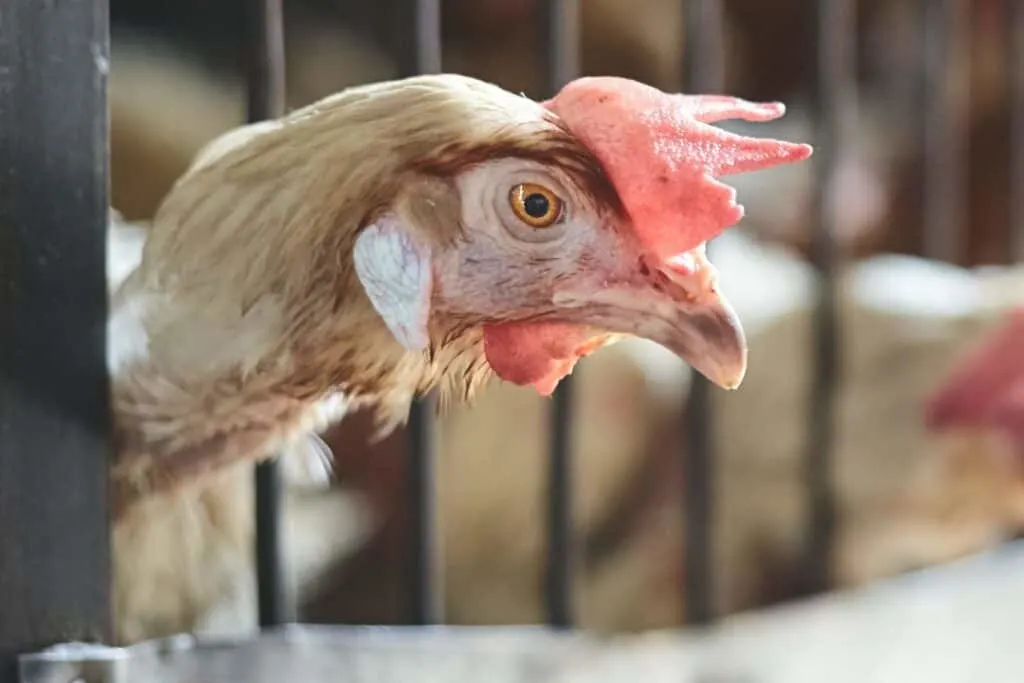
Other Medications
Corid
Corid (Amprolium) is a vitamin B1 (thiamine) blocker for the treatment of coccidiosis. It is also the additive in medicated chick starter feed.
Acidified Copper Sulfate
Acidified Copper Sulfate is an antimicrobial used for fungal diseases like sour crop and for cleaning watering systems.
Nystatin
Nystatin is an antifungal used to treat fungal infections like thrush.

Natural Treatments
VetRx
VetRx is often the first “go to” for birds showing signs of a respiratory illness.
VetRx is a homeopathic liquid made of 3.3% Alcohol, Canada Balsam, Camphor, Oil Origanum, and Oil Rosemary, blended in a corn base. The formula has been unchanged since 1874. According to the manufacturer, VetRx “provides effective relief and prevention of colds, roup, scaly legs, and eye worm, and may be used as a conditioner for show preparations.”
VetRx is essentially Vicks Vaporub that is formulated for birds. Like Vicks, VetRx will not treat or cure any chicken illness. However, it may help your chickens feel better and heal faster. VetRx can be used with other natural remedies or medications to treat your bird.
Apple Cider Vinegar
Apple cider vinegar is probably the most commonly used natural remedy with backyard chickens. Some folks use it daily, while others only use it when their bird is ill.
Apple cider vinegar is touted on the internet to be a cure-all for just about every possible chicken ailment. It is often suggested to reduce algae in the water, encourage chickens to drink more water, cure respiratory infections, deworm chickens, and prevent mites and lice.
Interestingly, there have been several scientific studies on the benefits of Apple cider vinegar for chickens. However, not all research on Apple cider vinegar reported positive findings, and some had conflicting results.
If you choose to use Apple cider vinegar with your flock, it is important that you never use it in metal or galvanized waterers. Vinegar will rust the waterer and leach chemicals into the drinking water.
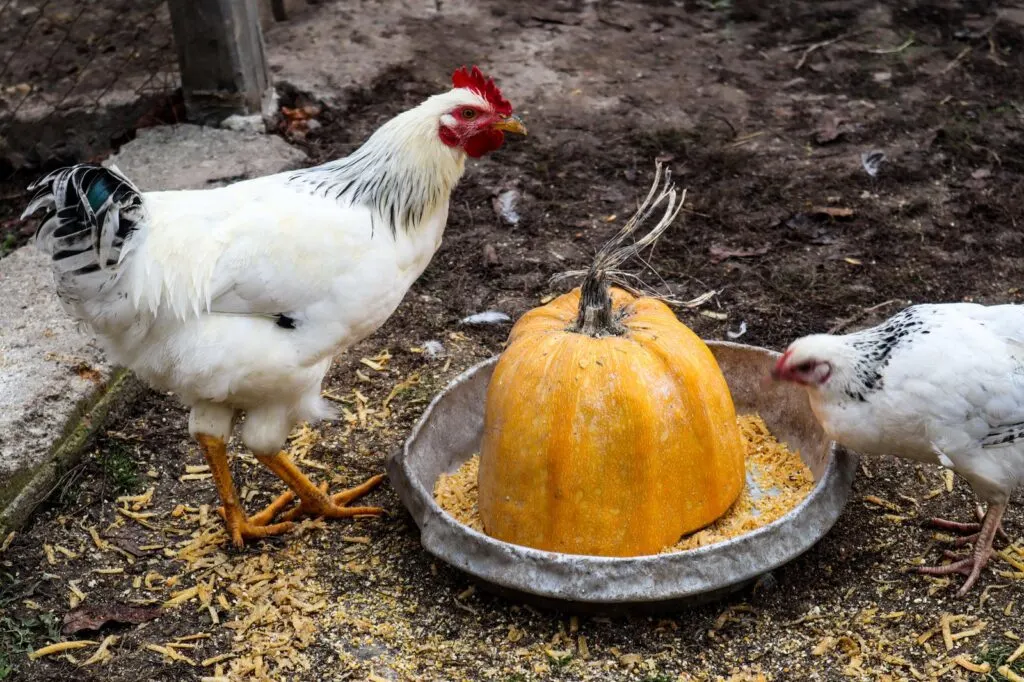
Pumpkin
Pumpkin is one of the most debated natural remedies for chickens, alongside apple cider vinegar and diatomaceous earth.
Pumpkin is often touted as a natural dewormer for chickens. Studies have shown this is accurate, but with a few caveats. These studies found that raw pumpkin seeds do not eliminate worms or treat active infections. However, they can significantly reduce the worm load. Pumpkin flesh does not contain the same deworming capabilities as the seeds.
Sick Chicken Symptom Checker Tool
Having a sick chicken can be a very stressful situation, and trying to figure out what is wrong can be overwhelming.
To help you figure out the underlying problem, we created a Sick Chicken Symptom Checker. The Symptom Checker asks a number of questions, and will give you a list of the most likely ailments based on your answers.
Finding A Chicken Vet
If you have not looked to see if a veterinarian in your area accepts chickens, please do so now. Finding a chicken vet if your bird NEEDS one can be difficult.
It is important to know if a vet is even within the realm of possibilities for you, in the event you decide that your chicken is faced with an illness or injury that you don’t feel comfortable treating on your own. It is equally important to know if you don’t have a chicken vet in your area so that you can make decisions accordingly.
There are very few vets that will see chickens and even fewer that specialize in birds. Try looking online and calling around. If a veterinarian’s office does not see chickens, ask them for a recommendation on who to call next. Social media can also be helpful in locating a veterinarian.
Mail-In Diagnostic Testing
There are a few mail-in testing labs that can help you diagnose a sick chicken. They can test for respiratory disease, intestinal worms, fungal disease, coccidiosis, and more.
These mail-in labs include:
Necropsy
If your sick chicken dies and you did not receive a diagnosis from your veterinarian, I would highly recommend sending the body off for a necropsy. If additional chickens should fall ill, you can use the information from the necropsy to treat other chickens. Find your local necropsy lab here.
Resources
If you would like additional information about your sick chicken, please consider the links below.
Unfortunately, I am not able to personally respond to emails regarding sick chickens, so please do not send any questions by email. I would like to offer an alternative. My Hens & Hives Facebook group is a good place to share your pictures and questions and I will do my best to answer them.
- Backyard Chickens– a great forum filled with incredible amounts of information!
- Merck Veterinary Manual
- Ailments of Chickens– Colorado State University Extension
- Differential Diagnosis of Respiratory Diseases in Poultry
- The Poultry Site Disease Guide
- Common Poultry Diseases– University of Florida, IFAS Extension
- Farm Health Online– Poultry Diseases
- Poultry Hub– Disease information
- Cornell University College of Veterinary Medicine

Amy
Thursday 23rd of September 2021
I wish there was a printer friendly version of this website. It'd help tremendously!
Nicole Gennetta
Thursday 23rd of September 2021
Thank you for your comment Amy! I actually cover all of this information in much greater detail in my 350 page Backyard Chicken Health Guide: Diagnosis & Treatment ebook - https://www.heritageacresmarket.com/shop-closed/